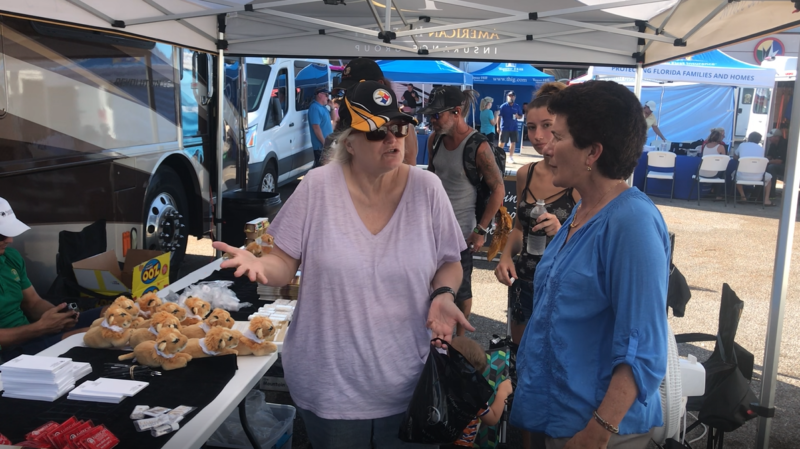Whether you’re an insurance consumer or professional, 2020 is providing lessons and insight into the changing Florida insurance market for 2021. How can you get the best priced coverage for your needs? And for insurance professionals, how can you better serve your customers now and in the long-run?
Host Lisa Miller, a former Florida Deputy Insurance Commissioner, talks with Amy O’Connor of the Insurance Journal and Carol Williams, a strategy and risk consultant for insurance companies, on the qualities insurance consumers – and the professionals who serve them – need to have in 2021 to get the most out of their insurance.

Amy O’Connor, Southeast Editor, The Insurance Journal and Associate Editor, MyNewMarkets.com

Carol Williams, Founder and CEO, Strategic Decision Solutions
Show Notes
With the COVID-19 pandemic, the biggest hurricane season on record in number of landfalls, a record-setting number of catastrophic events, growing insurance fraud, and double-digit homeowners insurance rate increases in Florida to name but a few, it’s little wonder folks are feeling overwhelmed at times – and powerless.
It’s been a challenging year for insurance consumers. Having an agent advocate is going to be more important than ever in 2021, according to Amy O’Connor, Southeast Editor of The Insurance Journal and Associate Editor of MyNewMarkets.com. “I’m hearing a lot of stories of people not getting coverage renewed, huge rate increases, coverage being scaled down,“ said O’Connor. Consumers may not understand what they’re losing. She advises to look at the policy and make sure you understand it or find someone who can help you. “The age of your home, the condition of your roof, all these things are going to be important to consider as you move forward into renewing existing policy or going with another company,” said O’Connor, who has covered the Florida insurance beat for the past six years.
Insurance companies are also being more proactive to help inform and educate consumers. They’re using different channels, including text messages and live chats, to focus on clear and helpful communication to policyholders, according to Carol Williams, Founder and CEO of Strategic Decision Solutions, based in Tallahassee, Florida. Companies are also developing advanced strategies to combat insurance fraud by third-party contractors and an increase in lawsuits, both key drivers – together with lagging hurricane claims and reinsurance costs – of rapidly rising Florida property insurance rates.
Williams said a growing number of insurance companies are starting their own repair programs, with a network of contractors ready to respond quickly to a policyholder’s claim. “Something that a lot of consumers overlook in thinking that the insurance companies are only out for themselves, is that the insurance company has skin in the game for making sure that your home is repaired correctly because they are still on the risk. They will still be providing coverage to you after the claim. They want to make sure it’s being done right,” said Williams, an 18 year veteran of the insurance industry and a strategy and risk consultant for insurance companies.

Lisa Miller (at right) helps a policyholder at the Panama City insurance village following Hurricane Michael, October 2018
O’Connor said insurance is not something that consumers understand very well and they really don’t want to learn a lot about it if they don’t have to, yet it’s something they have to have. “But the moment has come where everybody needs to start paying attention,” she said. Host Miller noted that “homeowners are insuring their largest asset yet agents are frustrated at times trying to get their customer’s attention. Consumers need to take the time.”
Part of the problem, Williams pointed out, is that property insurance is often dismissed as a once a year purchase paid out of the home mortgage escrow. But it’s “vital” that consumers take time to review their policies. “Just like people are always focused on having health insurance, property insurance is for the health of your home. People pour over their health insurance policy. You need to do the same thing for your property insurance policy,” advised Williams.
The podcast also discussed what insurance regulators can do, including setting the tone for the market and providing education about the actual insurance policy itself. Available consumer education resources include the National Association for Insurance Commissioners, which has overviews of different policy coverages.
Host Miller and guests also discussed COVID-19 and the impact the coronavirus pandemic has had on insurance. O’Connor said new procedures utilizing work-from-home technology for agents and remote claims handling practices in potential hurricanes will have a long-term benefit: greater adaptability and responsiveness to consumer needs, in an industry that can be slow to adapt to change. “Consumers are changing the way they do their business, especially with insurance, and they are demanding more from the industry,” she said.
COVID-19 has also accelerated the use of Insuretech, where consumers do everything on their phone or computer, from shopping for policies to signing-up for coverage. “That is definitely the path that insurance is going,” said Williams. “There are insurance companies in Florida that are specializing in that because they recognize that is a growing demand. Consumer expectations are changing, so they know they need to adjust with it.” There’s a long-term benefit here, too. Williams said the savings from avoiding some of the traditional manual labor of underwriting and claims are being passed along to consumers through lower premiums.
“I see the 2021 consumer being more price-sensitive,” added host Miller. “Prices of everything are going up in this time of COVID, including our insurance rates in Florida, and that’s going to force the issue of people being more sensitive to know what they are buying and ask more questions.” Among them: make sure you know what coverage you’re getting for the price and the quality of the company that is backing the policy. “Look at the financial ratings of the company, consumer complaints, do your research, and don’t make your decision based just on price,” warns Williams.
The podcast also touched on the upcoming 2021 session of the Florida Legislature. Florida is experiencing accelerated homeowners insurance rates, due more to increased litigation and questionable claims, than catastrophes. Regulators have approved about 100 rate increases in 2020, with a few close to 30%. Several companies have also reduced the number of policies they write each month with some deciding to stop writing new business completely while they wait for the rates to catch up to the costs.
The upcoming legislative session is going to be “hugely important” to the insurance market. There will be bills to try to bring necessary reforms that are seen as consumer friendly. O’Connor said Florida insurance consumers who are concerned about the rate increases, have more power than they may realize as constituents. “People need to look at and decide ‘is this something that I want to support and that I need to reach out to my lawmakers, my insurance agents, and find out is this going to benefit me and help our rates in the long-term or is it just going to keep going down this path?’ and it’s a pretty scary path in terms of cost.”
Links and Resources Mentioned in this Episode
Florida Property Insurance Market Inches Closer to Crisis – Part 1 and Part 2 (Insurance Journal, October 29-30, 2020)
National Association of Insurance Commissioners Consumer Resources
Bill Watch (Lisa Miller & Associates)
Assignment of Benefits & Insurance Litigation (Lisa Miller & Associates)
** The Listener Call-In Line for your recorded questions and comments to air in future episodes is 850-388-8002 or you may send email to [email protected] **

